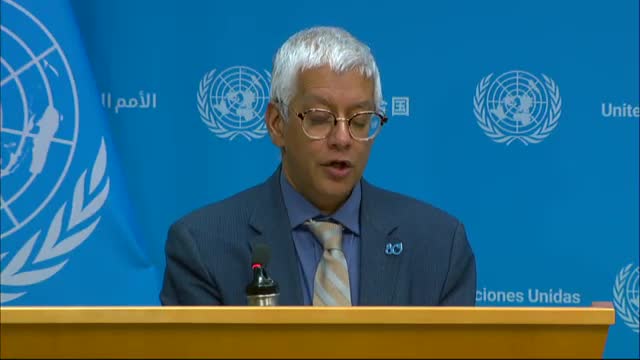UN: Partners distributing more than 1 million hot meals daily in Gaza as crossings constrain aid flow
Get AI-powered insights, summaries, and transcripts
Subscribe
Summary
A UN spokesperson said partners are scaling up food, nutrition and fuel deliveries in Gaza but called for more crossings and facilitation for nongovernmental organizations to increase aid access; the briefing also included updates on South Sudan floods, Ukraine and Haiti.
The United Nations reported that partners are distributing more than 1,000,000 hot meals daily across the Gaza Strip while efforts to scale water, sanitation and nutrition services increase — but officials said more crossings and facilitation are needed to meet rising needs.
A UN spokesperson told reporters on Oct. 24 that “partners working on food security say that they are now distributing over 1,000,000 hot meals daily across the strip.” The spokesperson said UN partners have reopened six UN‑supported bakeries, opened more than 20 new nutrition sites since the ceasefire that took effect Oct. 10 and now operate roughly 150 functional nutrition sites across Gaza.
The spokesperson said 20 mobile health and nutrition teams are being deployed across Gaza — “doubling the number of teams compared to pre‑ceasefire levels.” This week partners dispatched therapeutic food to treat more than 1,200 children with acute malnutrition and more than 32,000 jars of baby food intended to support about 760 infants and young children for two weeks.
On logistics, the spokesperson said partners collected 127 UN‑coordinated trucks for distribution inside the strip on Wednesday — 104 from Kerem Shalom and 23 from Kissufim — and that partners offloaded 199 trucks at the two crossings on the same day. The supplies included wheat flour, baby diapers, stoves, tents, health supplies, nutrition supplements and over 340,000 liters of diesel. The spokesperson also said five UN‑led humanitarian missions coordinated with Israeli authorities collected medical supplies, hygiene kits, winter clothes and fuel, including nearly 116,000 liters of diesel on one mission.
“The UN and our partners continue to scale up the humanitarian response in line with our 60‑day response plan,” the spokesperson said, adding that partners are also providing basic support at monitoring points for people on the move and that only about 10 percent of internally displaced people are in collective centers, with the majority in overcrowded makeshift sites.
On allegations concerning the UN Relief and Works Agency for Palestine Refugees (UNRWA), a reporter asked whether the United States or others might refuse to work with the agency. The UN spokesperson said that “UNRWA is the backbone of our humanitarian operations in Gaza,” and added that the agency had dismissed a small number of staff credibly linked to armed actors while other allegations lacked evidence in the cases reviewed.
The briefing also included country updates beyond Gaza. The spokesperson said the United Nations and partners are responding to severe flooding in South Sudan that have affected more than 960,000 people across six states and displaced some 335,000 people; the World Health Organization has delivered medical supplies and partners are carrying out needs assessments. The International Organization for Migration has signed an agreement committing $8,500,000 to flood‑resilient infrastructure and drainage work in Bor in Jonglei state, the spokesperson said.
In Ukraine, the spokesperson reported sustained attacks causing civilian casualties and damage to civilian infrastructure, with the Kherson region among the hardest hit; the UN cited scheduled power cuts in 12 regions and noted that humanitarian partners are supporting evacuations from frontline areas, including nearly 9,000 people through the Lozova transit center and more than 27,000 through the Kharkiv center since August.
Regarding Tropical Storm Melissa, the spokesperson said the UN and partners are coordinating preparation and response efforts across the Caribbean and that the Central Emergency Response Fund (CERF) allocated $4,000,000 to the World Food Programme, UNICEF and IOM to support more than 100,000 vulnerable people with prepositioned relief supplies, cash assistance and shelter materials.
Why it matters: The numbers cited by the UN reflect a major scale‑up of food and nutrition assistance in Gaza and urgent, simultaneous humanitarian needs across several regions. Officials emphasized that expanding crossings and facilitating NGO access are prerequisites to accelerating deliveries and reaching people in hard‑to‑reach areas.
Looking ahead: The UN spokesperson said partners would continue to collect and distribute supplies where crossings permit and urged that additional crossings be opened and access for nongovernmental organizations be facilitated to expand the response.
